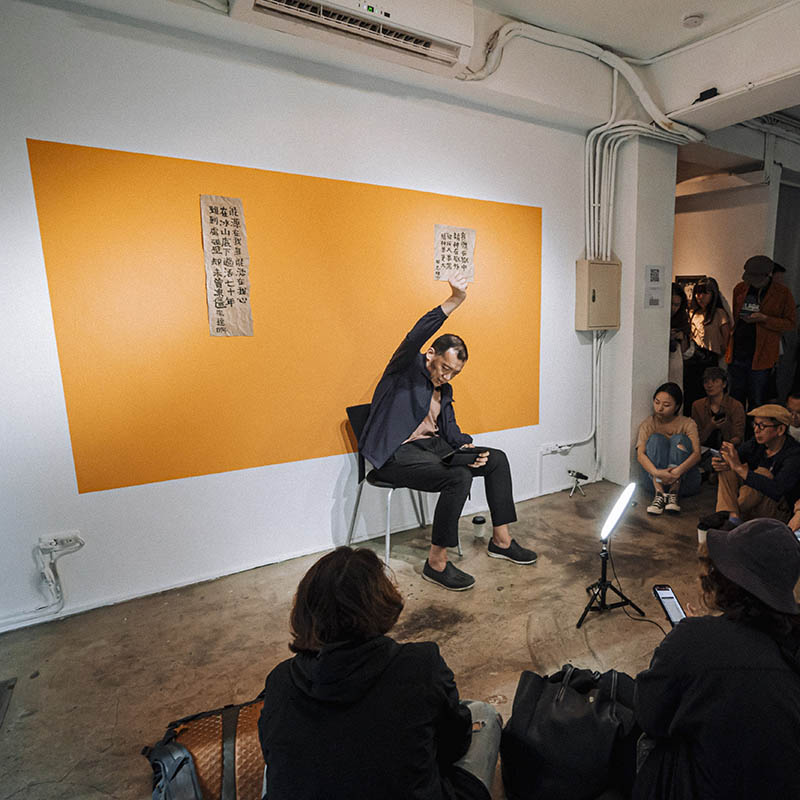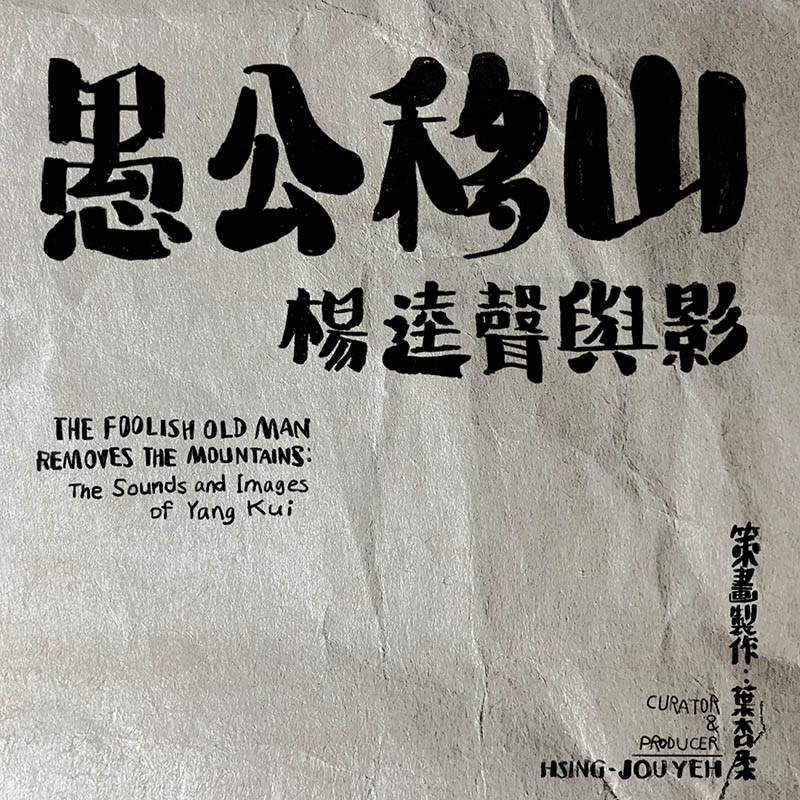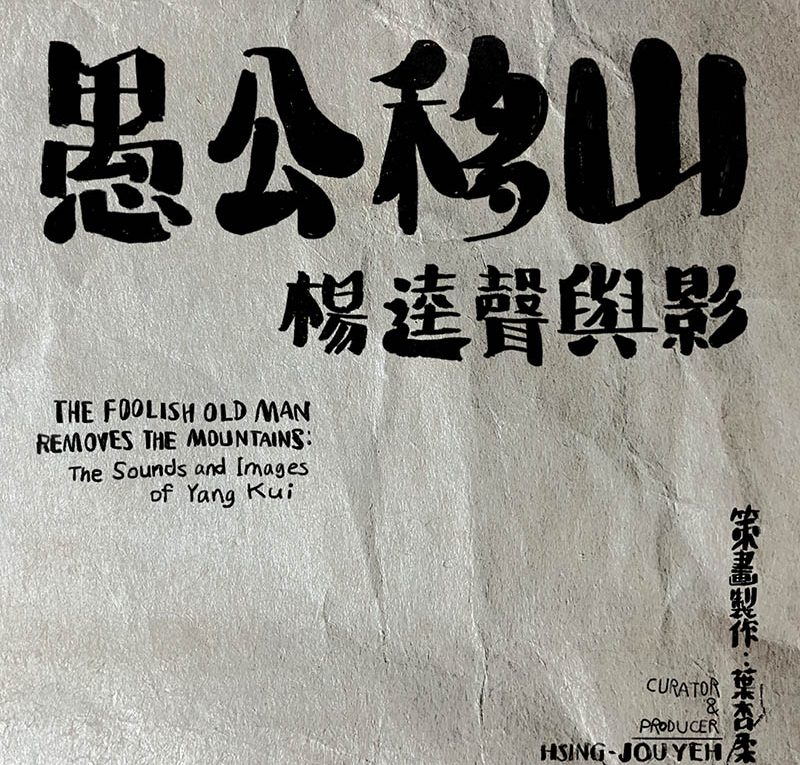The Foolish Old Man Removes the Mountains: The Sounds and Images of Yang Kui
The Foolish Old Man Removes the Mountains: The Sounds and Images of Yang Kui is an exhibition that includes installations, lecture performances, videos, and documents. This exhibition explores the historical process of “media transformation” in the literary works of Taiwanese veteran writer Yang Kui into music, songs, and concerts. This collaboration originates from TheCube Project Space’s exhibition project Sound Meridians initiated in 2020, focusing on how culture is transmitted and flows through sound, and how sound culture serves as a medium and material of historical topology to reflect the unique history and cultural features of a place. Following its exhibition in 2020 at the Museum of Contemporary Art Taipei, Sound Meridians continues to expand into several online exhibitions. The Foolish Old Man Removes the Mountains: The Sounds and Images of Yang Kui, curated by Yeh Hsing-Jou, started from her online exhibition The Foolish Old Man Removes the Mountains: The Sounds and Images of Yang Kui in the 1990s to further explore its historical depth and transform it into a curatorial initiative of a physical exhibition, presenting the archive and the works of three artists in response to the theme. The exhibition aims to offer the audience a multi-faceted form to reacquaint themselves with the works of Yang Kui and his influence on contemporary creation.
This series of program consists of three episodes.
About the exhibition The Foolish Old Man Removes the Mountains: The Sounds and Images of Yang Kui:
https://thecubespace.com/en/project/the-foolish-old-man-removes-the-mountains-the-sounds-and-images-of-yang-kui/
Epsiode-1: What to hear and why reciting Yang Kui’s Japanese translation of Lu Xun’s “The True Story of Ah Q”
feat. Cheng Wen-Tzong (Vincent Cheng), Dawang Yingfan Huang

Dawang Yingfan Huang’s contribution to the exhibition The Foolish Old Man Removes the Mountains: The Sounds and Images of Yang Kui is a lecture performance that took place on April 13, 2024. In this performance, Dawang Yingfan Huang recited Yang Kui’s Japanese translation of Lu Xun’s The True Story of Ah Q (1947, Taipei: Donghua Bookstore), selecting the chapters The Tragedy of Love‘ and A Great Reunion.
Why did Dawang Yingfan Huang choose The True Story of Ah Q as his reading story? Why did he transcribe Yang Kui’s Living Seventy Years Under an Iceberg (1974) and the opening poem of Ho Chi Minh’s Prison Diary (1943) on the wall behind him during the performance? These choices and substitutions are crucial to how Dawang Yingfan Huang interprets Yang Kui and how Yang Kui holds significance for Dawang Yingfan Huang.
This podcast episode features a conversation between spatial philosopher Cheng Wen-Tzong (Vincent Cheng) and Dawang Yingfan Huang. They discuss the memories evoked by the phonetics of the Japanese-translated texts of Yang Kui, interpreted by Dawang Yingfan Huang in his lecture performance, as well as Huang’s thoughts during the creation process.
Host: Hsing-Jou Yeh
Guest: Cheng Wen-Tzong (Vincent Cheng), Dawang Yingfan Huang
The Foolish Old Man Removes the Mountains: The Sounds and Images of Yang Kui, featuring Enkaryon Ang

#Yang Kui, #folk song, #folk song, #street theater, #The Separation of the Ox and the Plough”
Yang Kui (1906-1985) penned the essay “Sing Our Own Songs” in 1978, in response to the burgeoning “campus folk song movement” among Taiwan’s youth at the time. In this essay, Yang Kui confessed how songs in his seventy-year-long life have always sung the voice of ruling classes and thus served as “the Other,” so that he’s been a tone deaf since childhood. In that same year, inspired by Li Shuang-tze’s composition of “Three Cobblers” (1976), Yang Kui rewrote his own work into “The Foolish Old Man Removes the Mountains”. Yang Kui’s versification not only ”Sings One’s Own Song” but also “Let Literature Lyre (Make Literature Sing).”
Indeed, Yang Kui was keenly aware of the influence of folk music and drama on society at large. As a Taiwan writer of the “translingual generation,” his linguistic shifts and contemporary literary style are evident in the works he produced from the 1950s to 1980s, spanning his imprisonment on Green Island after the war and his residence in Tunghai Gardens post-release. Yang Kui’s creation of the genre of theater “street theater” during his imprisonment on Green Island (1951-1961), is a prime example.
The exhibition The Foolish Old Man Removes the Mountains invited writer and critic Enkaryon Ang to write an essay “Yang Kui’s Old Voices, New Ears” tracing from the “New Folk Song Movement” in Japan’s literary circles in the 1910s to Yang Kui’s evolution from a figure shaped by Japanese colonialism to a socialist literary figure. The essay analyzes Yang Kui’s post-war street theatre writings and how he responded to the “campus folk song movement,” exploring the continuity and resonance between folk music and songs. It also examines the potential for localization of both within the political environment of Taiwan’s post-war era, under the concern of socialist literature.
This podcast episode is hosted by Yeh Hsing-Jou, curator and producer of The Foolish Old Man Removes the Mountains: The Sounds and Images of Yang Kui, featuring an interview with Enkaryon Ang.
Enkaryon Ang is a Taiwanese writer, poet, and critic. His diverse body of work encompasses contemporary poetry, sound poetry, art criticism, photography, and video. Exploring themes such as identity, memory, climate change, and post-digital culture, Ang’s creations resonate with various tones. His particular interest lies at the intersection of art, science, and technology. Recently, he has delved into language politics, affective expressions, human coexistence, and ethical behavior during the Cold War era. As a resident writer, Ang has been invited to prestigious institutions including Cove Park in the UK, Grey Projects in Singapore, Can Serrat in Spain, and UNESCO City of Literature in Prague. Notably, Ang was elected as a fellow of Poesiæuropa in Italy for the year 2024. His poetry collections, anthologies, and critical works have been published and translated into foreign languages.
⚫️
⚫️ Yang Kui’s Old Voices, New Ears by Enkaryon Ang:
https://reurl.cc/Ajx0dQ
The Foolish Old Man Removes the Mountains: The Sounds and Images of Yang Kui, featuring Wu Sih-Fong

#Yang Kui, #street theater, #”The Separation of the Ox and the Plough,” #Folk Theater, #People’s Theater
During his imprisonment on Green Island from 1951 to 1961, Yang Kui spent prolonged periods alongside political prisoners from various provinces of mainland China. Learning Mandarin Chinese for the first time after the war, Yang Kui’s interest in folk songs, folk dances, and his acute sensitivity to drama and proletarian art prompted him to create a unique genre of theater known as “street theatre” during his time on Green Island.
Expanding on this topic,The Foolish Old Man Removes the Mountains exhibition invites theatre critic Wu Sih-Fong to write an essay exploring Yang Kui’s creation of “street theatre” in the 1950s, particularly its lineage in Taiwan’s little theatre movement since the 1980s. Specifically, Wu Sih-Fong examines how we can position the genealogy of Yang Kui’s theatrical history, especially between people’s theatre and grassroots theatre.
Wu Sih-Fong’s essay titled “After Peace Arrives: Yang Kui’s Script Writings” focuses on Yang Kui’s street theatre piece “The Separation of the Ox and the Plough,” detailing its plot and dialogue design. It speculates on Yang Kui’s scriptwriting strategies during that time, considering his identity as a political prisoner.
This podcast episode is hosted by Yeh Hsing-Jou, curator and producer of The Foolish Old Man Removes the Mountains: The Sounds and Images of Yang Kui, featuring an interview with Wu Sih-Fong.
WU Sih-Fong is a theater critic. He grew up in Taipei, and now lives in Hualien. His practice mainly focuses on participating in the theatre world through writing and editorial work, alongside planning and production projects. His interest lies in the practice of theater and re-reading its genealogy, the creation and operation of theater outside urban areas, theater ecology and its institutionalization, as well as theater review and media.
⚫️
⚫️ After Peace Arrives: Yang Kui’s Script Writings by Wu Sih-Fong:
https://reurl.cc/Wxpa8e

